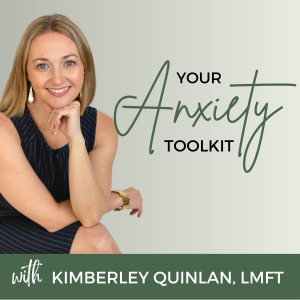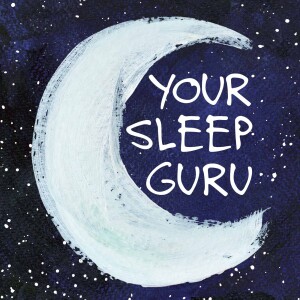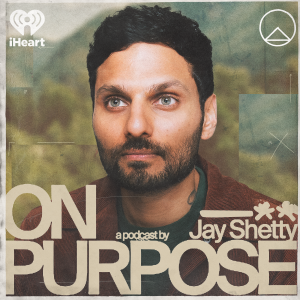
Your Anxiety Toolkit - Anxiety & OCD Strategies for Everyday
Health & Fitness:Mental Health
Today we talk all about how to manage when your fears appear in your dreams. This was a heavily requested topic, so I hope it was helpful for you.
In This Episode:- Why our fears and obsessions show up in our dreams
- What to do when your fears appear in your dreams
- How to manage the distress when dreams feel “real”
ERP School: https://www.cbtschool.com/erp-school-lp
Episode Sponsor:This episode of Your Anxiety Toolkit is brought to you by CBTschool.com. CBTschool.com is a psychoeducation platform that provides courses and other online resources for people with anxiety, OCD, and Body-Focused Repetitive Behaviors. Go to cbtschool.com to learn more.
Spread the love! Everyone needs tools for anxiety...
If you like Your Anxiety Toolkit Podcast, visit YOUR ANXIETY TOOLKIT PODCAST to subscribe free and you'll never miss an episode. And if you really like Your Anxiety Toolkit, I'd appreciate you telling a friend (maybe even two).
EPISODE TRANSCRIPTION
This is Your Anxiety Toolkit - Episode 295.
Welcome back, everybody. It is Episode 295, which sounds like a whole lot of episodes. It really, really does. Actually, it shocked me when I saw that number.
Today, we are talking about when your fears show up in your dreams. I would say quite regularly, actually, a client, particularly morning clients will often say like-- I’ll be like, “How are you? How was your week?” And they’ll say, “Well, I’m just feeling really overwhelmed. I had the most bizarre dream last night and it’s hard to shake it off.” And so, I’m wondering, I’m guessing. I’ve had this experience, I’m guessing you have too. And I wanted to talk this episode about how we might respond to that situation and what we need to look out for when we have this situation, particularly if you have anxiety. That’s really the specific group of humans we’re speaking to today. And I’ll share a little bit more about that as we get going.
All right, before we do that, let’s do the review of the week. This one is from FullWalrus and they said:
“I found this podcast by Googling an issue I was having, and this just popped up.” FullWalrus, this makes me so happy. Thank you so much for Googling this and finding me because that means we’re doing a good job at being on the internet and helping people in that way. “I had kept away from podcasts about mental health in fear of being triggered or being told I was crazy after all, and that didn’t happen obviously. Kimberley is a gifted presenter and a therapist who introduced me to Buddhism and mindfulness in a way I’d never thought of before. For the first time, I feel like I actually have the tools to help me manage OCD, and this show is sure a beautiful compliment to any therapy you should be currently undergoing because we all need therapy. Thank you for everything, Kimberley. My life is forever changed and I am forever grateful.”
Thank you, FullWalrus. What a wonderful, wonderful review. I just love hearing how I’m helpful. I love hearing what episodes are helpful and it’s really cool that I’m a really-- I love Buddhism. I find it to be exactly what I need every time I’m in a hard time. So, I’m so glad that I’m bringing that in a way that isn’t overwhelming or overpowering. So wonderful, wonderful, wonderful.
This week’s “I did a hard thing” is coming to you from Holly. Holly says:
“Last week, I went to court to obtain full custody of my son since his father has become a threat to him. This was extremely difficult seeing as we have been in an abusive past. My anxiety was the highest it’s been in a very long time, but ultimately, I knew I had to take action. I did my hard thing and I couldn’t be more proud of standing my ground and not succumbing to so many fears.”
Holly, sending you so much love. This is 100% doing the hard thing. It’s so hard, because often we’re talking about irrational fears and so forth, but I love that you brought like I’m doing this real thing. This real thing. And I love when you guys share with me both you’re facing your fears related to your disorder, but also just facing fear about showing up and living according to your values and showing up for your family. And Holly, just so good. Thank you so much for submitting that “I did a hard thing” for our “I did a hard thing” segment.
Okay. Let’s talk about dreams. So, again, often people will bring to my attention like, what do I do if my fears show up in my dreams, or even fears you didn’t have right. Like fears that you never considered during the day, but once you go to sleep, it gives it to you, sucks it to you, and whatnot. So, what do we do in this situation?
Most people will report they wake up in a massive ball of sweat, high heart rate. It feels so real. It feels like it actually happened. And it takes some time for that to burn off. It really, really does. Some people say it even takes the whole day to burn off. And so, if that’s the case for you, you’re definitely not alone.
Now, one thing to think about when we’re thinking about dreams is we’ve been fed this belief that dreams are like windows into our soul and that they must mean something, and that some people interpret dreams. In fact, I’ll tell you a story. I’m a clinician, I’m a CBT therapist. I use science-based treatment methods. And I do remember looking for a therapist several years ago actually and asking some colleagues. And one colleague, who knew me really well, referred me to this dream analyst. And I went for the first session. I was like, “This is not going to work for me,” mainly because of exactly what I’m going to tell you.
Now, if you like dream analysis, 100% no judgment. The reason that I had a strong reaction to it is I was going through a very, very anxious time, and I knew that if I engaged in that behavior, it was going to trigger me in ways that I’ll share here very soon.
The way I understand and the way I was trained and the way I’ve researched dreams is dreams, are just thoughts you have at night. So, if you’ve listened to this podcast, you’ll know that during the day, if you have a thought, I’m probably going to tell you, thoughts are thoughts. Don’t give them your attention. Don’t give them too much kudos. And so, dreams are no different. They’re just thoughts that you have while you’re asleep, and do your best not to give them a ton of importance, a ton of weight, a ton of value, because when you do that, you can get in trouble, particularly if they’re anxious thoughts.
Now, let me say here, I am notorious for having the weirdest dreams. My husband often, when we first got married, would sit up in the morning and be like, “Tell me everything you dreamed,” because I dream about like, I once had this dream about turtles and we went scuba diving together. And me and these turtles, they were like cartoon turtles. We’re like going through these tunnels together. Ridiculous stuff. I’ve had dreams of going hot air ballooning with a giraffe, and I have had this dream many, many, many times. I would say tens of times. And so, yeah, sometimes dreams are just silly and crazy. But where they’ve got fear attached or danger attached or catastrophes attached, it can be really hard for us to not get caught up in them.
So, the next question is, is it effective to interpret our dreams? My opinion is there’s nothing wrong with it, but here are the things to look out for. If you have a dream and it’s attached to your obsession and you’re interpreting your dream, it’s a chance that you’re doing compulsions to try and get certainty around that obsession. So, if you’ve already got the fear and the obsession, interpreting the dream actually maybe just reinforcing the fear, giving it too much importance, giving it too much value, and therefore feeding you back into a cycle where you’re going to keep having more of them, and you’re going to keep having anxiety about them, because you’re responding to them as if they’re important and dangerous.
If they’re just random like you wake up, often people say, “I had a dream that a loved one died,” or “I had a dream that a loved one was in an accident or it was my fault or so forth.” If you have that, what I would encourage you to do is look at it curiously. For me, it’s either like a really silly cartoon style dream or it’s that I’m responsible for something, which just is a sort of, if I’m curious about that, I’m like, yeah, that makes sense. I tend to be hyper-responsible. I tend to take responsibility very seriously. So, that makes sense. But I’m not going to go and dig around more than that because now I’m digging around in the content of my fears and giving those fears way, way, way, way too much attention. Way too much attention.
So, is it effective to interpret your dream? It depends. And I will say really clearly, if it is around your obsession, I strongly discourage you from doing it with one caveat, with one exception, which is unless it’s for the purpose of actually doing an exposure that’s scary. So, that would be the one time I would say, yes, it’s cool to interpret your dream. If you’re doing it on purpose in effort to actually induce the actual obsession and fear that you have so that you can practice tolerating the uncertainty and you can practice writing that wave of discomfort.
We can and we do do exposures to the content of your dreams. So, again, if a client has a dream or you have a dream and it’s triggering you, whether it was a part of your old obsession or just a new one, you can choose if it’s really bothering you to do an exposure. You could do an exposure with imaginal exposures. We cover imaginal exposures in ERP School, which you can go and find out about at CBTSchool.com if you’re interested. ERP School is our online course that teaches you how to apply ERP to your obsessions.
So, you could do an imaginal exposure where you write a story about your worst fear coming true and the consequences of that, and you read it over and over and over and you just allow the anxiety to rise and fall. You could do that. Or let’s say if it’s a fear like, not long ago, I had a dream about this one area of the corner of my kid’s school. It was like this really bad thing happened. So, if it’s really bothering me and I’m struggling with reducing my mental compulsions about that. Yeah, I might go into that corner and just sit there and read a book or just wait there for my kids or whatnot. So, yes, you can do exposures to the content of your dreams, particularly again, if they’re really strong, repetitious, and they seem to be persistent.
What we can do in addition to that is apply a ton of mindfulness to the dream content itself. So, this is what this would look like. You wake up, whether it’s from the morning or from a nap. You’ve had a dream. It’s really overwhelming. It feels really real. It might even feel like you’re actually in the moment of this catastrophe or this event. And even though it feels real, we’re actually just going to be mindful of that.
Now, what does mindfulness mean? Let’s do a quick recap. Mindfulness is being present with what’s actually happening. So, within that moment, what’s actually happening is things feel unreal, things feel strange, things feel scary. Your heart might be beating faster. You might be sweating. You might have a tummy ache. So, that’s what’s happening. We’re present with that, but we’re also present with what else is happening. Oh, the birds are chirping. I feel my pajamas against my skin. This is the taste of the coffee I’m drinking. I can smell the coffee as well. We’re just being very mindful of what else is happening, and we’re doing all of that nonjudgmentally.
Key point: We’re doing all of this. We’re having the weird feeling. We’re having the anxiety. We’re smelling the coffee. We’re feeling our feet against the floor and we’re practicing not judging these things as good or bad, even though they might be uncomfortable. When we are acknowledging that they’re here, we’re allowing them. We’re being willing to experience them, not pushing them away, and we’re practicing being non-judgmental.
Now you may need to do this, and this is often our clients will say, “Yeah, I did that, and then it kept bothering me.” And I’ll say, “Well, did you do it again? Could you do it a little longer?” And they’ll go, “Yeah, I did. But then it kept bothering me.” And I’ll joke with them. I try never to be condescending, but I’ll say, “But did you then do it again? Did you keep going?” And that’s the key to mindfulness. Mindfulness, we don’t do these behaviors to make the discomfort go away. We do them moment by moment, minute by minute, 10 seconds by 10 seconds, just to practice being in the presence of this discomfort and giving the discomfort zero of our tension.
Now, the other thing we may want to do here is activate a behavior. So, if you’re feeling totally overwhelmed, totally anxious, everything feels like it really actually happened. A lot of clients will say somebody died in their dream and they actually cry and they’re experiencing grief as if it actually happened. That’s true too. That often happens. We would engage in behavioral activation of going, “If I didn’t have this feeling, what would I be doing?” Such a good question. If I didn’t have this experience, what would I be doing? And go and do that thing.
So, if I didn’t have this dream, I’d be getting up and I’d probably go for a walk or I’d sit down and check my emails or whatever it may be. Make sure you do those things and try not to divert away from the behaviors you would’ve done had you not had this dream. That’s the response prevention piece. If you didn’t have this dream, would you be giving this content your attention?
So, let’s say I had a dream about my child dying, which is devastating, the idea of it. So, when we say I wake up and I feel like it actually happened, my body is telling me it actually happened, even though maybe my child is right in front of me. Then how do I engage with the rest of the day? Am I ruminating about ways to prevent that from happening? Am I actually implementing behaviors to prevent it from happening? Because if I’m doing those things, I’m actually doing compulsions. I’m trying to solve a thought that I had, not an actual thing.
And so, this is why this is so important that we understand that dreams are just thoughts you have at night or during sleep. That doesn’t mean that they’re important and they need to be analyzed and that it’s a sign of something to come, because we wouldn’t do that with an intrusive thought. We’re learning not to do that. So, when we have a thought, we’re learning not to go, “Oh my gosh, that must mean it’s a sign.” We’re learning to undo that reaction and going, “Yeah, thoughts are thoughts.”
So, this is how I want you to maybe consider changing your response to dreams, especially scary dreams. Again, let me be really clear. If you love analyzing dreams and you find it helpful and you don’t find it loops you back into the anxious cycle, wonderful. No problem. I’m definitely not against dream analysis. But for those folks who were anxious, I just want you to know this information, keep it in your back pocket, or maybe even your front pocket for the times when you catch yourself engaging in behaviors that become ineffective.
My word of 2022 is “effective.” I have it written everywhere. It’s a huge part of the decisions I make every day, every minute. Does this keep me in being effective? And so, it’s such a great question when we ask ourselves, is this behavior effective? It won’t always be, you don’t always have to be effective. But sometimes again, when you catch trends that are getting you to be ineffective, we want to see if we can make a change. Okay?
So, that’s Episode 295: When your fears show up in your dreams. I hope it was helpful. Do not forget, it is a beautiful day to do hard things. This work is not easy, friends. This work is actually-- let’s just be real. This work sucks. It really, really does. It’s exhausting. It’s hard. It’s taxing. It beats you down. So, please be gentle. It is a beautiful day to do hard things. Please remind yourself of how brave and strong you are because you’re stronger than you think. And I will see you next week.
Have a wonderful day.
More Episodes
Ep. 104: Honor Your Hard Things
 2019-06-07
2019-06-07
Ep. 103: A Journey of Self-Compassion with Ethan Smith
 2019-05-31
2019-05-31
Ep. 102: Managing Sleep Anxiety
 2019-05-24
2019-05-24
Ep. 101: How To Be Uncertain
 2019-05-17
2019-05-17
Ep. 100: The Mental Health Virtual Party of The Year
 2019-05-10
2019-05-10
Ep. 99: Making The Choice to Embrace Panic (with Jeremy Quinlan)
 2019-05-03
2019-05-03
Ep. 98: Three Mindfulness Basics for Anxiety and Depression
 2019-04-26
2019-04-26
Ep. 97: The Emotional Stages of Recovery - Rebuilding Life After OCD (with Chris Trondsen)
 2019-04-19
2019-04-19
Ep. 96: Religious (scrupulosity) and Moral Obsessions (with Dr. Jed Siev)
 2019-04-12
2019-04-12
Ep. 95: Love vs. Fear with Catherine DeMonte
 2019-04-05
2019-04-05
Ep. 94: Doing the “hard thing” is worth it! Life after OCD with Shawnté Johnson
 2019-03-29
2019-03-29
Ep. 93: How to WANT Anxiety with Dr. Reid Wilson
 2019-03-22
2019-03-22
Ep. 92: Four Massive Life Changes
 2019-03-15
2019-03-15
Ep. 91: Intuitive Eating with Evelyn Tribole
 2019-03-08
2019-03-08
Ep. 90: You Are Not Alone (with Morgan Rondinelli and Molly Fishback)
 2019-03-01
2019-03-01
Ep. 89: Five Common Mistakes We Make Managing Anxiety
 2019-02-22
2019-02-22
Ep. 88: The Flow of Recovery
 2019-02-15
2019-02-15
Ep. 87: Kristin Neff Talks All Things Self-Compassion
 2019-02-08
2019-02-08
Ep. 86: The Science of Exposure and Response Prevention (ERP)
 2019-02-01
2019-02-01
Ep. 85: Harm OCD with Jon Hershfield
 2019-01-25
2019-01-25
Create your
podcast in
minutes
- Full-featured podcast site
- Unlimited storage and bandwidth
- Comprehensive podcast stats
- Distribute to Apple Podcasts, Spotify, and more
- Make money with your podcast
It is Free
You may also like

Therapy in a Nutshell


Your Sleep Guru Podcast


Anxiety Slayer™ with Shann and Ananga


The Dr. John Delony Show


On Purpose with Jay Shetty


- Privacy Policy
- Cookie Policy
- Terms of Use
- Consent Preferences
- Copyright © 2015-2024 Podbean.com



 iOS
iOS Android
Android